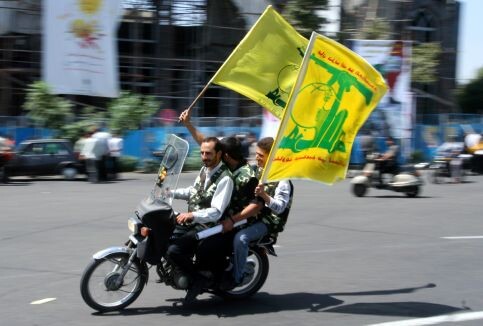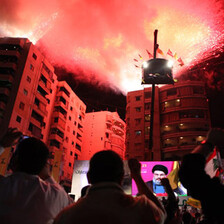The Electronic Intifada 10 November 2010

Iranian public support for Hizballah represents common beliefs in political independence and liberty for all of the world’s peoples. (Seyed Reza Hoseini/MaanImages)
Iranian President Mahmoud Ahmadinejad’s recent visit to Lebanon electrified the country and reinvigorated the feeling of moral righteousness and defiance that has for years characterized the Lebanese Hizballah and others who identify with resistance to Zionism and US imperialism.
Standing amongst the throngs of supporters in Beirut’s Dahiyeh neighborhood, it was hard not to be swept away with the enraptured crowd as “Nejad” addressed the masses. Viewers across the country, in houses sympathetic with the Hizballah-led opposition coalition as well as those opposed to it, tuned in to watch the man who represents Iran’s long-lasting commitment to the Lebanese resistance and its struggle against Israel and for political independence.
There we were, standing together in defiance against Israel, and against the Lebanese who refuse to recognize Iran and Hizballah’s role in saving Lebanon from Israel, in calling for an alternative world order in which “rogue,” “evil” and “terrorist” are not synonyms for those who oppose Israel’s and the US’s militarism and occupations. Ahmadinejad, and Iran more broadly, represent this multipolar, anti-imperialist vision. The message of national political freedom and independence is deeply meaningful in a region where peoples have been long denied their national rights and self-determination.
The rush I felt during the speech, however, soon dissipated as I left the roar of the crowds behind me. The freedom Ahmadinejad spoke of, the pride in Lebanon’s ability to retain its independence thanks to the resistance, were qualities I had been proud of since childhood, and were a great part of the myth of Lebanon I grew up with as an Iranian. Not only was this a country of great beauty, of cosmopolitanism, and of freedom — this was the hallowed land of the resistance, of those who had given their blood and their lives to expel the Zionist occupation and had through it all remained faithfully committed, as we were, to Palestinian freedom.
However, seeing this man welcomed like a hero and as a symbol of the Iranian people left a deeply bitter taste in my mouth. As proud as I am of the independent political path our country has taken and the role it plays as an enabler of resistance to Israel, I am deeply aware of the great costs we have been forced to bear as a people by our government. The national resistance to colonialism and oppression abroad has gone hand in hand with our repression domestically. The state-sponsored violence and mass arrests that have shaken our country for the last 16 months are not what the resistance looks like.
Our solidarity with the Lebanese resistance and with the Palestinians should not be pendant on our willingness to silence ourselves domestically, and the acceptance of this silencing by many Lebanese and many Palestinians deeply pains those of us who marched last year yelling “People why are you seated, Iran has become Palestine” and “Whether Iran or Gaza, stop killing people.” We are not traitors, nor pro-American, nor Zionist “agents” — we merely want the same freedom to live, to exist and to resist as we demand for the Palestinians and for the Lebanese.
Unfortunately for us, from the first day of the protests in June of last year the cause of Iranian freedom was hijacked by foreign governments, foreign media and Iranian expatriates who observed from afar the crowds demanding greater civil and social rights. These exploiters spun around and declared shamelessly that what all Iranians really wanted was to overthrow the Islamic Republic and welcome American tanks in Tehran.
Their supposed support of our movement suffers from blind spots, however. Repeated statements from the protestors and from Green Movement leadership in support of anti-imperialist causes and linking the freedom of the Iranian people to that of other oppressed peoples around the world have been ignored in the media and by Iranians abroad. Whatever doesn’t fit the script of secular, pro-Western young Iranians who so dearly long for the chance to dance publicly to Lady Gaga goes ignored.
On 13 June 2010, I was released from an underground detention center in Tehran along with approximately 900 other young people rounded up the day before, the anniversary of last year’s elections, for being near the site of a planned protest (which never actually occurred). While I had no “questionable” material on me and was thus only hit over the head a few times and forced to sign a confession before being released, those in my cell wearing green or holding any subversive political material were beaten and tortured with taser guns as we sat around them, blindfolded, fearing we would be next.
We understand that Nasrallah, being a recipient of Iranian largesse, cannot publicly come out in favor of a movement that opposes the current president. However, we hope that he as well as intellectuals within the Lebanese Hizballah movement would call for the same respect for freedom and human rights that they have shown within their own movement to be exercised for their comrades in the Islamic Republic of Iran — those like me and thousands of others whose only crime is to demand greater freedoms. If not, the Lebanese Hizballah, the Palestinians and the global progressive movement risk alienating large swathes of the Iranian public and endangering the deep solidarity felt by the majority of Green Movement Iranians towards the causes of anti-imperialism and anti-Zionism in the Middle East.
Iranian public support for Hizballah, and for various other grassroots social movements in the Middle East, in the Americas and elsewhere, is not a result merely of shared goals or interests, but of an understanding that we have common beliefs in political independence and liberty for all of the world’s peoples. In acknowledging the great progress Iran has made in education, healthcare, industry and many other fields since the Iranian Revolution (and this progress must be acknowledged in any frank dialogue on the Iranian situation), it is vital that we and those who stand with the people of Iran also acknowledge how our personal freedoms have been sacrificed by our government for the sake of our national independence, and every day Iranians are paying the price.
Khashayar Safavi is an activist based out of Beirut, Lebanon.


